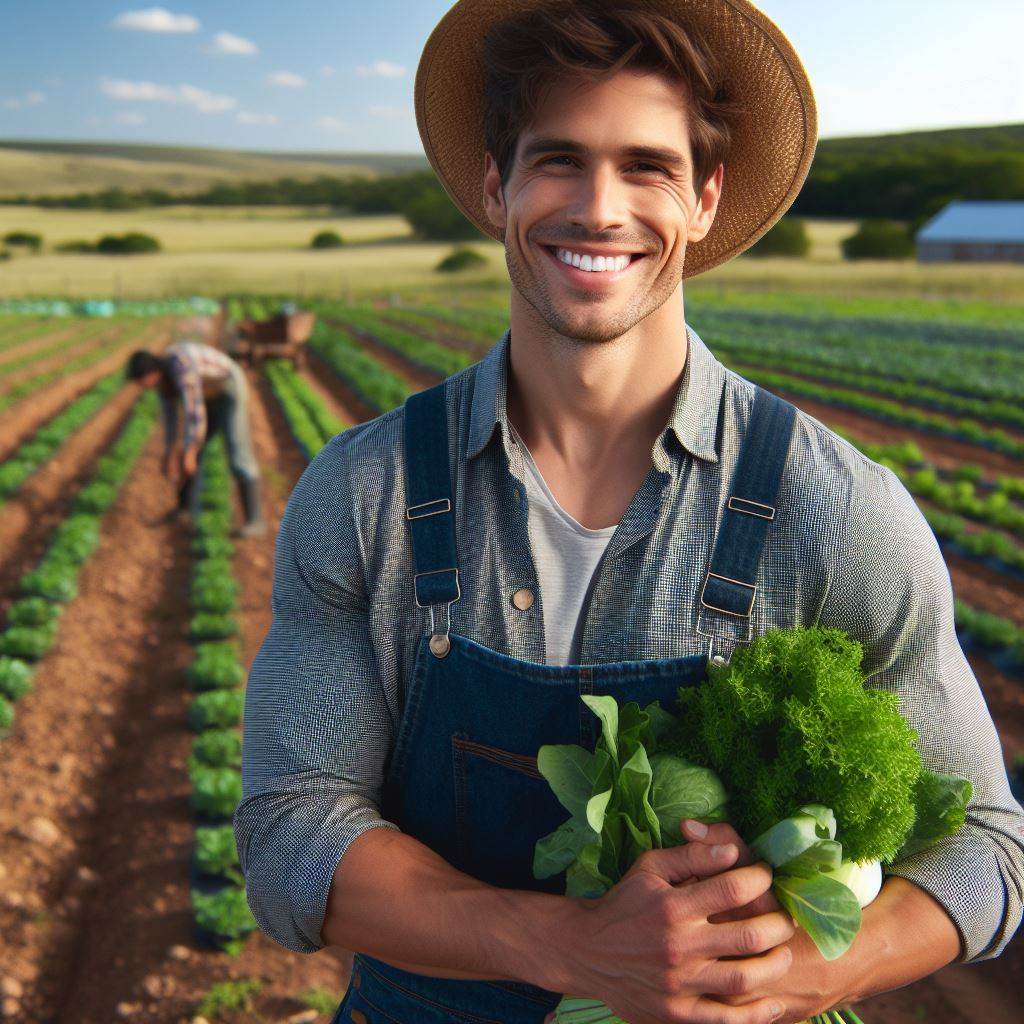Introduction
A. Empowering Female Farm Entrepreneurs
Women are reshaping the agricultural landscape, carving their niche in farm entrepreneurship.
The trend of female-led farms is on the rise, marking a significant shift in the traditionally male-dominated industry.
It’s crucial to spotlight their invaluable contributions and navigate the challenges they face.
B. Key Points
- Female farm entrepreneurs are revolutionizing the sector with innovative practices.
- Women’s participation in farming has increased by X% in the past decade.
- Recognizing and addressing the unique challenges women face in farming is essential.
- Highlighting success stories of female farm entrepreneurs can inspire others to join the industry.
- Empowering women in farming contributes to sustainable agriculture and economic growth.
- The journey of female farm entrepreneurs embodies resilience, determination, and passion for agriculture.
- Providing support and resources tailored to women in farming is crucial for their success.
- Addressing gender disparities in access to land, finance, and markets is vital for gender equality in agriculture.
Basically, the rise of female farm entrepreneurs is not just a trend but a significant paradigm shift in the farming industry.
By acknowledging their contributions, overcoming challenges, and empowering them with the right resources, we can foster a more inclusive and sustainable agricultural sector.
Challenges Faced by Female Farm Entrepreneurs
In the world of farming, women entrepreneurs face unique challenges due to their gender.
These challenges range from stereotypes and biases to limited access to financial support and resources.
Additionally, there is a lack of representation and support in traditionally male-dominated sectors.
Let’s explore these obstacles in detail:
A. Gender-specific challenges in the farming industry
- Female farmers often encounter bias and stereotyping based on traditional gender roles.
- They may face skepticism and doubt about their ability to succeed in a predominantly male industry.
- A lack of support networks specifically designed for women in farming can make it harder to navigate certain obstacles.
- Women may also face challenges in finding appropriate workwear and equipment designed for their needs.
B. Obstacles related to stereotypes and biases
- Women entrepreneurs in farming often face stereotypes that assume they are not as knowledgeable or capable as their male counterparts.
- These biases can hinder their access to opportunities for growth and success in the industry.
- Some potential customers or business partners may hold outdated beliefs about women’s ability to handle the physical demands of farming.
C. Difficulties in accessing financial support and resources
- Female farm entrepreneurs may struggle to secure loans or investment capital due to gender bias within the financial industry.
- They may have limited access to programs and resources specifically tailored to their needs.
- Acquiring land can be challenging for women, as they may face discrimination or a lack of opportunities.
- The lack of financial resources can limit their ability to invest in modern technology and equipment, hindering their productivity and competitiveness.
D. Lack of representation and support in traditionally male-dominated sectors
- Female farm entrepreneurs may feel isolated and underrepresented in industry events and networks.
- A lack of female role models and mentors within the farming industry can make it harder for women to envision themselves as successful entrepreneurs.
- The absence of support systems and networking opportunities tailored to their unique challenges can hinder their professional growth.
- Access to training and education programs that address gender-specific needs may also be limited.
Despite these challenges, many female farm entrepreneurs have found innovative ways to overcome obstacles and achieve success in the industry.
Their resilience and determination serve as an inspiration for future generations of women in farming.
Read: Farming with Kids: A Family’s Journey
Success Stories of Female Farm Entrepreneurs
In today’s agricultural landscape, there is a growing trend of female farm entrepreneurs who are making waves and breaking barriers.
These inspiring women have not only succeeded in running their farms but have also brought innovation and creativity to the industry.
Here, we highlight their accomplishments and unique approaches.
A. The Power of Female Farm Entrepreneurs
- Meet Jane, a determined woman who turned her small family farm into a thriving business.
- Jane’s venture began with traditional farming methods, but she quickly realized the need to adapt.
- She embraced innovation by implementing sustainable practices and using modern technology.
- Through her creativity, Jane introduced new products and diversified her revenue streams.
B. Unconventional Paths to Success
- Sarah, another female farm entrepreneur, defied societal norms by pursuing farming against all odds.
- She recognized the potential of organic farming and dedicated herself to its principles.
- By creating a niche market, Sarah established herself as a pioneer in organic produce.
- Her commitment to quality earned her a loyal customer base and significant financial success.
C. Innovation and Creativity as Catalysts for Success
- These success stories illustrate the indispensable role of innovation and creativity in farming.
- Whether it’s adopting alternative farming techniques or developing unique marketing strategies, these women have thrived.
- They constantly seek ways to improve efficiency, reduce waste, and deliver exceptional products.
- By embracing change and thinking outside the box, they continue to push the boundaries of traditional farming.
D. Paving the Way for Change
- Successful female farm entrepreneurs not only inspire others but also have a profound impact on their communities.
- They create employment opportunities and support local economies.
- Through their commitment to sustainable practices, they promote environmental stewardship.
- By actively engaging with the community, they foster a stronger sense of connection and food security.
The rise of female farm entrepreneurs is an empowering phenomenon that demonstrates the strength and resilience of women in the agricultural industry.
Their stories of success inspire others to challenge conventions and pursue their dreams.
Through their innovative approaches, these women continue to reshape the farming landscape, benefiting not only themselves but also their communities.
As we celebrate their achievements, let us recognize and support the important role of female farm entrepreneurs in creating a sustainable and inclusive future for agriculture.
Read: Agroforestry on a Small Scale: Farmer’s View

Supportive Initiatives and Networks
- Various initiatives and organizations are playing a crucial role in supporting female farm entrepreneurs.
- The Women, Food, and Agriculture Network (WFAN) is dedicated to empowering women in sustainable agriculture.
- American Agri-Women (AAW) is the largest coalition in the US advocating for women who are passionate about agriculture.
- Local Chambers of Commerce often have programs and resources specifically designed for female entrepreneurs in the farming sector.
- The National Sustainable Agriculture Coalition (NSAC) works to support policies that benefit women farmers.
- The Women’s Agriculture Network (WAgN) provides educational and networking opportunities for women involved in farming.
A. Role of government programs and policies
- Government programs and policies also play a significant role in supporting female farm entrepreneurs.
- The United States Department of Agriculture (USDA) offers grants, loans, and educational programs specifically aimed at women farmers.
- The Farm Service Agency (FSA) provides resources and financial opportunities to women farmers.
- The USDA’s Rural Development program supports female entrepreneurs in rural areas through loans and technical assistance.
- The Small Business Administration (SBA) provides resources and assistance to women-owned agricultural businesses.
B. Networks and platforms that provide mentorship and networking opportunities
- Networks and platforms that provide mentorship and networking opportunities are invaluable for female farm entrepreneurs.
- The Female Farmer Project is an online platform that showcases and connects women in farming around the world.
- The American Business Women’s Association (ABWA) provides mentorship and networking for women in various industries, including farming.
- Agripreneurship Alliance is a global network that supports farm entrepreneurs through peer learning and collaboration.
- The National Women in Agriculture Association (NWIAA) offers resources, training, and networking events for women in agriculture.
- Women Who Farm is a social media community that connects and supports female farmers worldwide.
C. Importance of collaboration and knowledge-sharing
- Collaboration and knowledge-sharing among female farm entrepreneurs are crucial for their success.
- Sharing best practices, innovative techniques, and lessons learned can help overcome challenges and foster growth.
- Participating in farmer’s markets, conferences, and workshops allows women farmers to connect and learn from each other.
- Collaborative projects and partnerships can provide access to new markets, shared resources, and economies of scale.
- Online forums and communities enable women in farming to seek advice, share experiences, and build relationships.
- Mentorship programs pair experienced female farmers with aspiring entrepreneurs to provide guidance and support.
- In fact, supportive initiatives, government programs, networks, and knowledge-sharing platforms are empowering female farm entrepreneurs.
- These resources and collaborations not only provide valuable support but also contribute to the growth and success of women in farming.
Read: Beating Drought: A Texas Farmer’s Tale
Tips for Aspiring Female Farm Entrepreneurs
Are you a woman dreaming of starting your own farm business?
Here are some practical tips to get you started:
- Start Small, Grow Smart: Begin with manageable goals and scale up as you gain experience and resources.
- Get Educated: Specialized training in agriculture, business management, and marketing can boost your success.
- Build Your Network: Connect with other female farmers, mentors, and industry professionals for support and advice.
- Seek Funding Opportunities: Look for grants, loans, and crowdfunding options tailored to women in agriculture.
- Embrace Technology: Use digital tools and platforms to streamline operations, market your products, and manage finances.
- Diversify Your Income: Explore value-added products, agritourism, and alternative revenue streams to increase profitability.
- Focus on Sustainability: Adopt environmentally friendly practices to enhance the long-term viability of your farm.
- Take Care of Yourself: Farming can be physically and mentally demanding, so prioritize self-care and work-life balance.
- Stay Resilient: Entrepreneurship comes with challenges, but perseverance and a positive mindset can help you overcome them.
- Celebrate Your Successes: Acknowledge your achievements, no matter how small, and use them as motivation to keep growing.
Remember, you’re not alone on this journey.
Transform Your Agribusiness
Unlock your farm's potential with expert advice tailored to your needs. Get actionable steps that drive real results.
Get StartedBuilding a strong support system of like-minded individuals can make all the difference.
Surround yourself with people who believe in your vision and can offer guidance and encouragement along the way.
Together, we can cultivate a future where female farm entrepreneurs thrive.
Read: Small Farm, Big Debt: A Financial Saga
Conclusion
The rise of female farm entrepreneurs is an inspiring trend that deserves recognition and support.
These women have overcome various challenges to establish successful businesses in the farming industry.
It is crucial to acknowledge their contributions and pave the way for further progress.
Promoting discussions and advocacy for gender equality in agriculture will not only empower these women but also benefit the entire farming community.
By embracing diversity and equal opportunities, we can ensure a more inclusive and sustainable future for the agricultural sector.
Let us come together to celebrate, uplift, and amplify the voices of female farm entrepreneurs.




